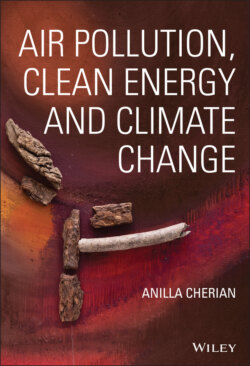Читать книгу Air Pollution, Clean Energy and Climate Change - Anilla Cherian - Страница 12
Box 1.3 Chronic obstructive pulmonary disease: under‐recognition and inequitable impacts on the poor.
Оглавление‘COPD remains a growing but neglected global epidemic. It is under‐recognised, under‐diagnosed and under‐treated resulting in millions of people continuing to suffer from this preventable and treatable condition. The lower an individual’s socio‐economic position, the higher their risk of poor health: women and children living in severe poverty have the greatest exposures to HAP.
In the poorest countries, cooking with solid fuels can be the equivalent of smoking two packs of cigarettes a day. A 1‐year old would have accumulated a two pack year smoking history having never seen tobacco. Inaction to mitigate COPD therefore exacerbates health inequalities.
Climbing the “energy ladder” occurs gradually as most LMIC households use a combination of fuels. The poorest, at the bottom of the ladder, use crop waste or dung which is the most harmful when undergoing incomplete combustion. Those at the top of the ladder use electricity or natural gas. Increasing prosperity and development has a direct positive correlation with increasing use of cleaner and more efficient fuels for cooking.
The unmet global burden of COPD is a silent killer in LMICs. In conclusion, we suggest that given the high and rising global burden of COPD, a revolution in the diagnosis and management of COPD and exacerbations of COPD in LMICs must be an urgent priority’.
Source: emphasis added, Quaderi and Hurst (2018).
Box 1.4 excerpted from the WHO’s special report on climate change and human health lists key linkages between energy related air pollution, climate change and public health impacts.
